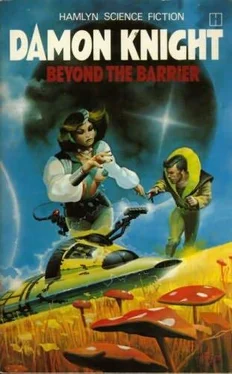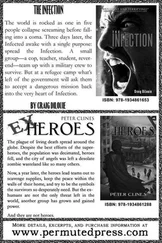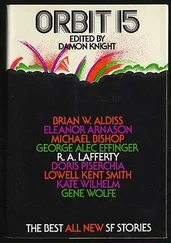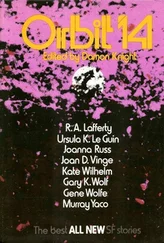Damon Knight - Beyond the Barrier
Здесь есть возможность читать онлайн «Damon Knight - Beyond the Barrier» весь текст электронной книги совершенно бесплатно (целиком полную версию без сокращений). В некоторых случаях можно слушать аудио, скачать через торрент в формате fb2 и присутствует краткое содержание. Год выпуска: 1964, Жанр: Фантастика и фэнтези, на английском языке. Описание произведения, (предисловие) а так же отзывы посетителей доступны на портале библиотеки ЛибКат.
- Название:Beyond the Barrier
- Автор:
- Жанр:
- Год:1964
- ISBN:нет данных
- Рейтинг книги:3 / 5. Голосов: 1
-
Избранное:Добавить в избранное
- Отзывы:
-
Ваша оценка:
- 60
- 1
- 2
- 3
- 4
- 5
Beyond the Barrier: краткое содержание, описание и аннотация
Предлагаем к чтению аннотацию, описание, краткое содержание или предисловие (зависит от того, что написал сам автор книги «Beyond the Barrier»). Если вы не нашли необходимую информацию о книге — напишите в комментариях, мы постараемся отыскать её.
Serialized originally in 3 parts: Dec. 1963, Jan. 1964, April 1964 editions of
Beyond the Barrier — читать онлайн бесплатно полную книгу (весь текст) целиком
Ниже представлен текст книги, разбитый по страницам. Система сохранения места последней прочитанной страницы, позволяет с удобством читать онлайн бесплатно книгу «Beyond the Barrier», без необходимости каждый раз заново искать на чём Вы остановились. Поставьте закладку, и сможете в любой момент перейти на страницу, на которой закончили чтение.
Интервал:
Закладка:
BEYOND THE BARRIER
by Damon Knight
Chapter One
The banked, fan-shaped classroom was silent with attention.
“And now,” said Professor Gordon Naismith, “watch closely.
I drop the charged particle into the tank.” He tripped the release of the mechanism suspended over the big glass tank, and saw a silvery spicule drop, almost too quickly to follow, into the clear liquid.
“Contact with other partially charged molecules releases the time energy,” said Naismith, watching a sudden silvery cloud spread from the bottom of the tank, “and, as you see—”
The silvery cloud grew rapidly, advancing on a wave front, a beautifully symmetrical curve that was determined by two factors: gravity, and the kinetic loss of the conversion process.
It was perfect beauty, far beyond any curve of flesh or any line drawn by an artist, and Naismith watched it with a painful tightness in his throat, although he had seen it a hundred times before.
Now the change was complete. The tank was full of silvery fluid, opaque, mirror-bright and luminous. “All the liquid has now been raised to a higher temporal energy level,” Naismith told the class, “and is in the state you may have heard described as ‘quasi-matter.’ Tomorrow, when we begin our experiments on this tank, we will see that it has some very odd physical properties. However, that concludes today’s demonstration. Are there any questions?”
A student signaled with his desk light. Naismith glanced at the nameplate. “Yes, Hinkel?” He stood beside the table on the dais, tall and big-framed in his laboratory smock, aware as he answered the students’ questions that eight other Naismiths, in the other identical classrooms that radiated from a common center, were also standing, like eight mirror images of himself, also answering questions. It gave him an eerie shiver, just for a moment, to realize that he himself was one of the doppelgangers, not the “real” Naismith—somehow that was almost impossible to accept, no matter how often one went through the experience… then the moment passed, and he went on talking, calm, self-assured, his voice controlled and resonant.
The tone sounded, and the students began to stir, gathering their recording equipment and sliding out of their seats.
Naismith turned and fumbled for the duplicator control. The round brownish-black knob was hard to see, like a floating shadow on the tabletop. He found it at last, and turned it clockwise.
At once the half-empty classroom vanished. He was in the tiny, circular control room, alone except for the duplicator apparatus. His knees suddenly weak, he leaned against the demonstration table. Discordant memories swarmed through his head—nine sets of them, all at once, like interfering video broadcasts. It was hard to take, just for a moment, but after two years of it he was an experienced multiple-class teacher, and the nine sets of memories settled quickly into place in his mind.
As he prepared to leave, he became aware of an odd thing that had happened. The demonstration itself had been exactly the same in all nine classrooms, of course; it was only the questions afterward that had been different, and even those followed a familiar pattern.
But one of the students in—which was it? classroom 7—had stepped up to the platform just as he was about to leave, and had said something extraordinary.
He stood still, trying to bring the memory into sharper focus.
It was a dark-skinned girl who sat in the second row: Lall was her name, probably Indian, although it was odd that she sat apart from the whispering, giggling group of Indian girls, bright in their saris and gold earrings, who perched at the top of the classroom. She had looked up at him with her oddly disturbing amber eyes, and had said in a distinct voice: “Professor, what is a Zug?”
Nonsensical question! It had nothing to do with the demonstration, or with temporal energy at all—in fact, he was sure there was no such word in the vocabulary of physics. And yet it was odd what a shock had gone through him at her words: as if, deep down in his subconscious, the question did mean something—and something vital. He could remember snapping to attention, all his senses taut, a cold sweat beading on his forehead….
And then what? What had he replied?
Nothing.
At that moment, the action of turning the control knob had been completed, and he had come out of the multiple state.
Then the shock of reintegrating his consciousness, and now…
Zug.
The word had an unpleasant sound, somehow; it made a shudder of distaste run up his spine. Probably the girl was disturbed, that was all; he would put in a query to the college psychiatric office.
But as he left the control room, taking the rear stair to his office, the feeling of vague apprehension and unease lingered.
Perhaps it was the strain of multiple-class work; not everyone could bear it. But he was proud of his ability to stand up under the load; he had never felt like this after a class.
He finished his day’s record-keeping and left quickly, anxious to be out in the air. The afternoon was sunny and warm as he walked across the campus; he could hear the surf in the distance, and the Inglewood-Ventura monorail went hushing across, bright cream and tan against the blue sky.
Students were walking in little groups along the gravel paths between the flame trees. The lawns were richly green, neat and trim. The scene was familiar, soothing… and not entirely real.
It depressed him to realize that after four years he still felt essentially disoriented. Everyone said he had made a remarkable recovery; he had passed his refresher courses with high marks, gotten his teaching license renewed: now he was established, competent . . and after all, these four years were all the memory he had: so why couldn’t he settle down and feel at home?
Why should he feel there was some terrible secret buried in his past?
Irritated, he tried to shake off the mood, but the girl and her question kept coming back to the surface of his mind. It was ridiculous, and yet he couldn’t help wondering if perhaps she had some connection with the lost thirty-one years of his life
… the blank, the emptiness that was his image of himself before the bomber crash that had almost killed him….
Zug…
Impulsively, he turned and took the path to the university library. There was a vacant information machine. He punched
“General,” and then spelled out “Z-U-G.”
The machine’s transparency flashed, “SEARCHING,” and then, after a second, “GEOGRAPHY (EUROPA).” On the central screen appeared a portion of a page of text. Naismith read, “Zug. (tsooK) 1. Canton, n. central Switzerland, area 92 square miles. Pop. 51,000. 2. Commune, its capital, on Lake of Zug S of Zurich; pop. 16,500.”
Naismith turned off the machine in disgust. Of course, he was wasting his time. It was a little surprising that there should be such a word at all; but the girl had said “a Zug” and besides, she hadn’t pronounced it as if it were German. This couldn’t be the answer.
As he was leaving the library, he heard his name called.
Plump Mr. Ramsdell, the bursar, came hurrying toward him along the graveled path between the flame trees, holding out a parcel wrapped in white paper. “How lucky to run into you like this,” Ramsdell panted. “Someone left this at my office for you, and I absent-mindedly carried it out with me—” He laughed uncertainly. “I was just going to take it over and drop it at the Science Building, when I saw you.”
Naismith took the parcel: it was unexpectedly heavy and hard inside the white paper. “Thanks,” he said. “Who left it for me, anyone I know?”
Читать дальшеИнтервал:
Закладка:
Похожие книги на «Beyond the Barrier»
Представляем Вашему вниманию похожие книги на «Beyond the Barrier» списком для выбора. Мы отобрали схожую по названию и смыслу литературу в надежде предоставить читателям больше вариантов отыскать новые, интересные, ещё непрочитанные произведения.
Обсуждение, отзывы о книге «Beyond the Barrier» и просто собственные мнения читателей. Оставьте ваши комментарии, напишите, что Вы думаете о произведении, его смысле или главных героях. Укажите что конкретно понравилось, а что нет, и почему Вы так считаете.










